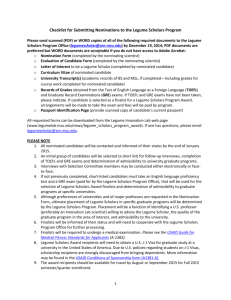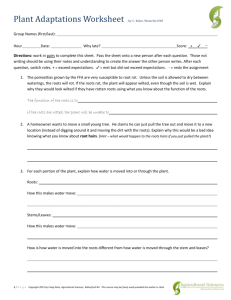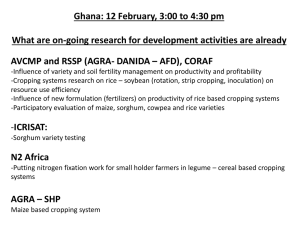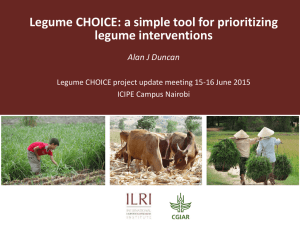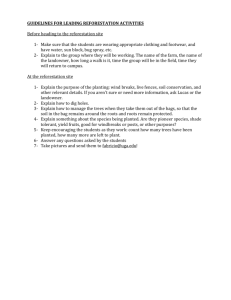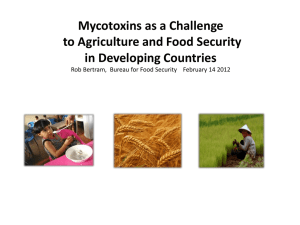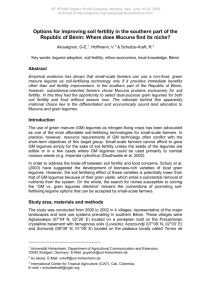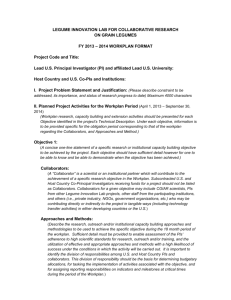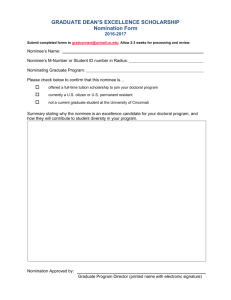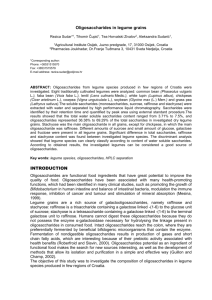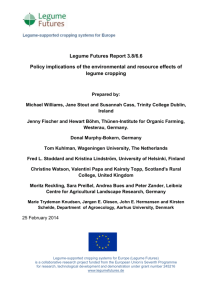Request for Nominations for Legume Scholars Program Graduate
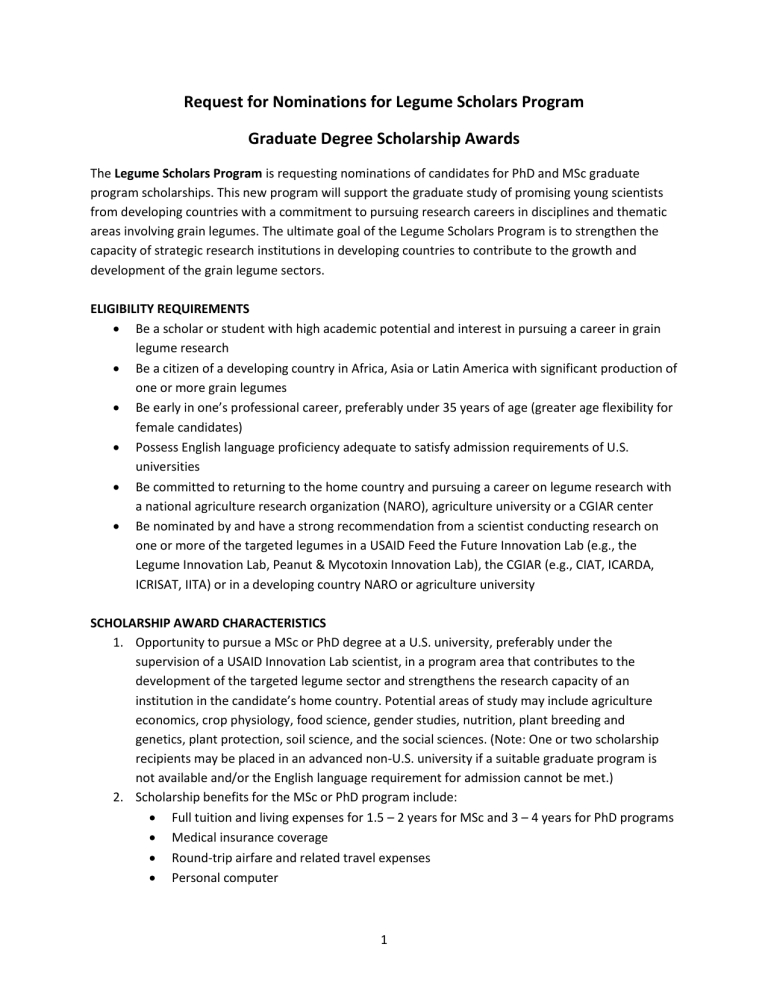
Request for Nominations for Legume Scholars Program
Graduate Degree Scholarship Awards
The Legume Scholars Program is requesting nominations of candidates for PhD and MSc graduate program scholarships. This new program will support the graduate study of promising young scientists from developing countries with a commitment to pursuing research careers in disciplines and thematic areas involving grain legumes. The ultimate goal of the Legume Scholars Program is to strengthen the capacity of strategic research institutions in developing countries to contribute to the growth and development of the grain legume sectors.
ELIGIBILITY REQUIREMENTS
Be a scholar or student with high academic potential and interest in pursuing a career in grain legume research
Be a citizen of a developing country in Africa, Asia or Latin America with significant production of one or more grain legumes
Be early in one’s professional career, preferably under 35 years of age (greater age flexibility for female candidates)
Possess English language proficiency adequate to satisfy admission requirements of U.S. universities
Be committed to returning to the home country and pursuing a career on legume research with a national agriculture research organization (NARO), agriculture university or a CGIAR center
Be nominated by and have a strong recommendation from a scientist conducting research on one or more of the targeted legumes in a USAID Feed the Future Innovation Lab (e.g., the
Legume Innovation Lab, Peanut & Mycotoxin Innovation Lab), the CGIAR (e.g., CIAT, ICARDA,
ICRISAT, IITA) or in a developing country NARO or agriculture university
SCHOLARSHIP AWARD CHARACTERISTICS
1.
Opportunity to pursue a MSc or PhD degree at a U.S. university, preferably under the supervision of a USAID Innovation Lab scientist, in a program area that contributes to the development of the targeted legume sector and strengthens the research capacity of an institution in the candidate’s home country. Potential areas of study may include agriculture economics, crop physiology, food science, gender studies, nutrition, plant breeding and genetics, plant protection, soil science, and the social sciences. (Note: One or two scholarship recipients may be placed in an advanced non-U.S. university if a suitable graduate program is not available and/or the English language requirement for admission cannot be met.)
2.
Scholarship benefits for the MSc or PhD program include:
Full tuition and living expenses for 1.5 – 2 years for MSc and 3 – 4 years for PhD programs
Medical insurance coverage
Round-trip airfare and related travel expenses
Personal computer
1
Field research at a CGIAR Center or in a developing country research institution
Participation in leadership and professional development workshops
3.
Compliance with USAID “Participant Training” regulations; all trainees will be given assistance in applying for a J-1 Visa with requirement to return to home country for two years following graduation. The J-1 Visa application process will be handled by the Legume Scholars Program
Office at Michigan State University, not by the university where the student will be placed.
USAID strongly discourages dependents from accompanying trainees.
NOMINATION PROCEDURE
1.
Nomination packages for Legume Scholars Program candidates should be prepared by eligible scientists in consultation with interested developing country candidates. The following documents should be included in the nomination package: o Nomination Form (completed by the nominating scientist) o Evaluation of Candidate Form (completed by the nominating scientist) o Letter of Interest (prepared by the candidate expressing interest in pursuing a graduate degree program and stating commitment to return to home country/region following graduate study to pursue a research career at an agriculture research institution, focusing on grain legumes. (See “Guidelines for Letters of Interest” document.) o Curriculum Vitae (current CV of the nominated Legume Scholar candidate) o Transcript(s) of academic records (BS and MSc if completed—including grades for course work completed) o Records of grades obtained from English Language Proficiency (TOEFL) and Graduate
Record Examinations (GRE) exams. (Note: Nomination packages may be submitted without TOEFL and GRE grades. Selection of Legume Scholars Award recipients, however, will be contingent upon obtaining satisfactory grades on these exams since they are required for admission to graduate programs at U.S. universities. Financial assistance is available to cover the costs of these exams.)
2.
Nomination forms and associated documents can be downloaded from http://legumelab.msu.edu/news/legume_scholars_program_award . Questions regarding eligibility or the application and selection process can be directed to the Legume Scholars
Program Office ( legumescholar@anr.msu.edu
), the Peanut & Mycotoxin Innovation Lab (Dave
Hoisington, Director, davehois@uga.edu
) or the CGIAR Research Program on Grain Legumes
(Noel Ellis, Director, N.Ellis@cgiar.org
).
3.
Completed nomination package documents must be submitted electronically in PDF format as attachments to an email to legumescholar@anr.msu.edu
on or before Friday, December 19,
2014, for an August/September 2015 start of the graduate program. Review the CHECKLIST document before sending.
SCHOLARSHIP SELECTION PROCESS
Nomination packages will be reviewed and evaluated after the closing date for submissions. A Selection
Committee with representatives from the sponsoring programs and USAID will be responsible for reviewing nominations and selecting Legume Scholars Program award recipients. Interviews will likely
2
be conducted with short-listed nominees. Nominees will be informed as soon as possible of selection decisions. Selected scholarship recipients will be expected to cooperate with the Legume Scholars
Program Office at Michigan State University in completing the TOEFL and GRE exams, admission applications to university graduate schools, visa applications, and arrangements for international travel.
SPONSORING PROGRAMS
CGIAR Research Program on Grain Legumes http://grainlegumes.cgiar.org/
The CGIAR Research Program on Grain Legumes is a collaborative ten-year research program that focuses on improving chickpea, cowpea, common bean, faba bean, groundnut, lentil, pigeonpea and soybean crops grown by poor smallholder families in five target regions to combat poverty, hunger, malnutrition and environmental degradation.
The Program is a global research for development collaboration involving scientists at four member institutions of the CGIAR Consortium with the International Crops Research Institute for the Semi-Arid
Tropics (ICRISAT) as the lead center along with the International Center for Tropical Agriculture (CIAT)
CIAT, the International Center for Agricultural Research in the Dry Areas (ICARDA) and the International
Institute of Tropical Agriculture (IITA) along with several public and private institutes and organizations, governments, and farmers worldwide.
Feed the Future Innovation Lab for Collaborative Research on Grain Legumes (Legume Innovation Lab) www.legumelab.msu.edu/
The Feed the Future Innovation Lab for Collaborative Research on Grain Legumes (Legume Innovation
Lab) is a research and institutional capacity strengthening program (2007–2017) funded by the U.S.
Agency for International Development ( USAID) and administered by Michigan State University. The program contributes to economic growth and food and nutrition security through knowledge and technology generation that strengthens grain legume (e.g., bean, cowpea, etc.) value chains in developing countries of Africa and Latin America. To achieve its objectives, the program supports multidisciplinary collaborative research between U.S. universities, National Agriculture Research
Organizations (NAROs), agriculture universities and the CGIAR in twelve USAID Feed the Future focus countries in Sub-Saharan Africa and Latin America.
Feed the Future Innovation Lab for Collaborative Research on Peanut Productivity and Mycotoxin
Control (Peanut & Mycotoxin Innovation Lab) http://pmil.caes.uga.edu/index.html
The Feed the Future Innovation Lab for Collaborative Research on Peanut Productivity and Mycotoxin
Control, the Peanut & Mycotoxin Innovation Lab (PMIL) for short, is supported by USAID and administered by the University of Georgia. The mission of the PMIL is to apply leading innovative U.S. science to improve peanut (groundnut) production and to improve food safety by mitigating the negative impacts of contamination of peanut and other crops from toxins produced by soil-borne fungal pathogens (known as “mycotoxins”) in developing countries. PMIL collaborative research and institutional strengthening projects are focused in five Feed the Future countries: Ghana, Haiti, Malawi,
Mozambique and Zambia.
3
